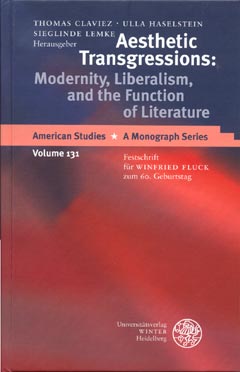Aesthetic Transgressions: Modernity, Liberalism, and the Function of Literature
Thomas Claviez/Ulla Haselstein/Sieglinde Lemke (eds.)
Aesthetic Transgressions - Modernity, Liberalism, and the Function of Literature
(
The debate over the function of aesthetics can be traced back to the New Criticism and its aftermath. After its theoretical axioms and criteria of judgment have been debunked as ideologically charged in recent decades, two factions emerged. A number of critics defended the value of aesthetic complexity, i.e., of ambiguity, irony, and negativity, and refused to accept the arguments of ideology critique attacking the concept of aesthetic autonomy. Revisionist critics, however, tended to emphasize marginalized aesthetic categories, described the respective textual features of canonical texts as complicity with the social status quo, and concentrated on art previously omitted from critical study because of its political or social agenda. Today, the dialogue between the two increasingly exhausts itself in mutual accusations of political partizanship.The essays collected in this volume address this rift by re-introducing the notion of the aesthetic which was threatened to be obliterated from critical discourse in American literature. They draw attention to the fact that the literary imagination represents a specific social field of meaning production and calls for a specific attitude of the reader towards language as a means of reality-production. In their close readings, the authors analyze the actual strategies of the cultural-political work of literature. Consequently, their analyses highlight both the critical evaluations concerning the political implications of literary form and the different historical functions a text can fulfill at the time of its publication and later on.
Contents:
T. CLAVIEZ / U. HASELSTEIN / S. LEMKE
Introduction
The Transformative Potential of the Aesthetic
WOLFGANG ISER
Modes of Emergence
HERBERT GRABES
Timely or Out of Joint? Transformations of the Aesthetic and Cultural Change
EMORY ELLIOTT
Aesthetic Headaches: Politics and Art in the American Novel
Response: ULLA HASELSTEIN
The Power of Illusion and the Illusion of Power
DONALD E. PEASE
Leo Marx’ ‘
Possibilities and Limits of Aesthetic Transgressions
ANSGAR NÜNNING
Steps Toward a History of the Changing Cultural Functions of Literature: Metaphoric and Poetic Fictions of British Imperialism as a Test Case
Response: ASTRID FRANKE
The Poet’s Burden
SIEGLINDE LEMKE
Transgressive Aesthetics: Awe, Alterity, and Apprehension in The Scarlet Letter
STEFAN L. BRANDT
Hawthorne’s Negative Romanticism: Aesthetic Self-Reflection and the Discursivity of Story-Telling in “Rappacini’s Daughter”
CHRISTOF DECKER
The Ambiguous Critique of Lynch Law: Fritz Lang and
SUSANNE ROHR
Transgressing Taboos: Projecting the Holocaust in Melvin Bukiet’s After and Jonathan Safran Foer’s Everything Is Illuminated
Modernism and the Function of Literature
HEINZ ICKSTADT
Aesthetic Experience and the Collective Life: John Dewey’s Democratic Aesthetics and the Peculiarities of American Modernism
THOMAS CLAVIEZ
“Muted Fanfares”: The Topos of the Common Man in the Works of Walt Whitman, William Carlos Williams, and James Agee
KURT MÜLLER
Modernist Point of View Techniques and the Ethics of
FRANK MEHRING
“You don’t know Paree!” Cultural Indifference in The Sun Also Rises
DALIA EL-SHAYAL
“The Athenian Sun in an African (American) Sky: Rita Dove’s Grecian Gift
